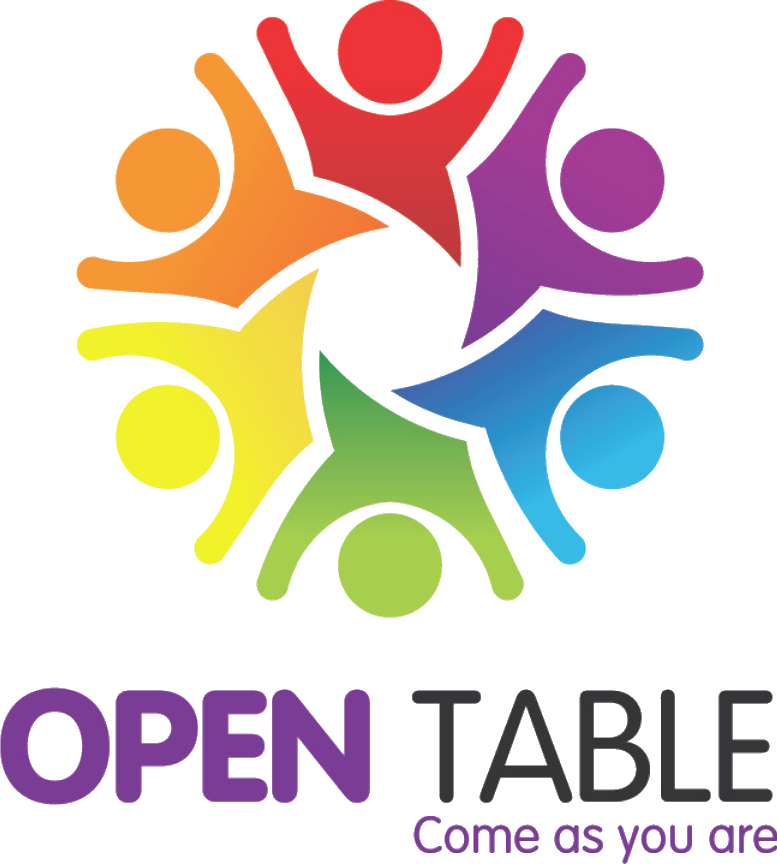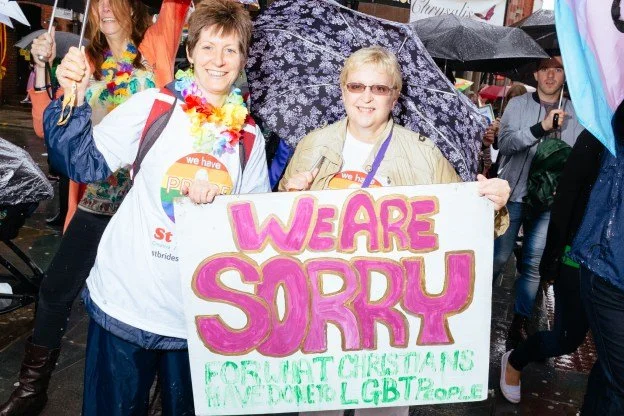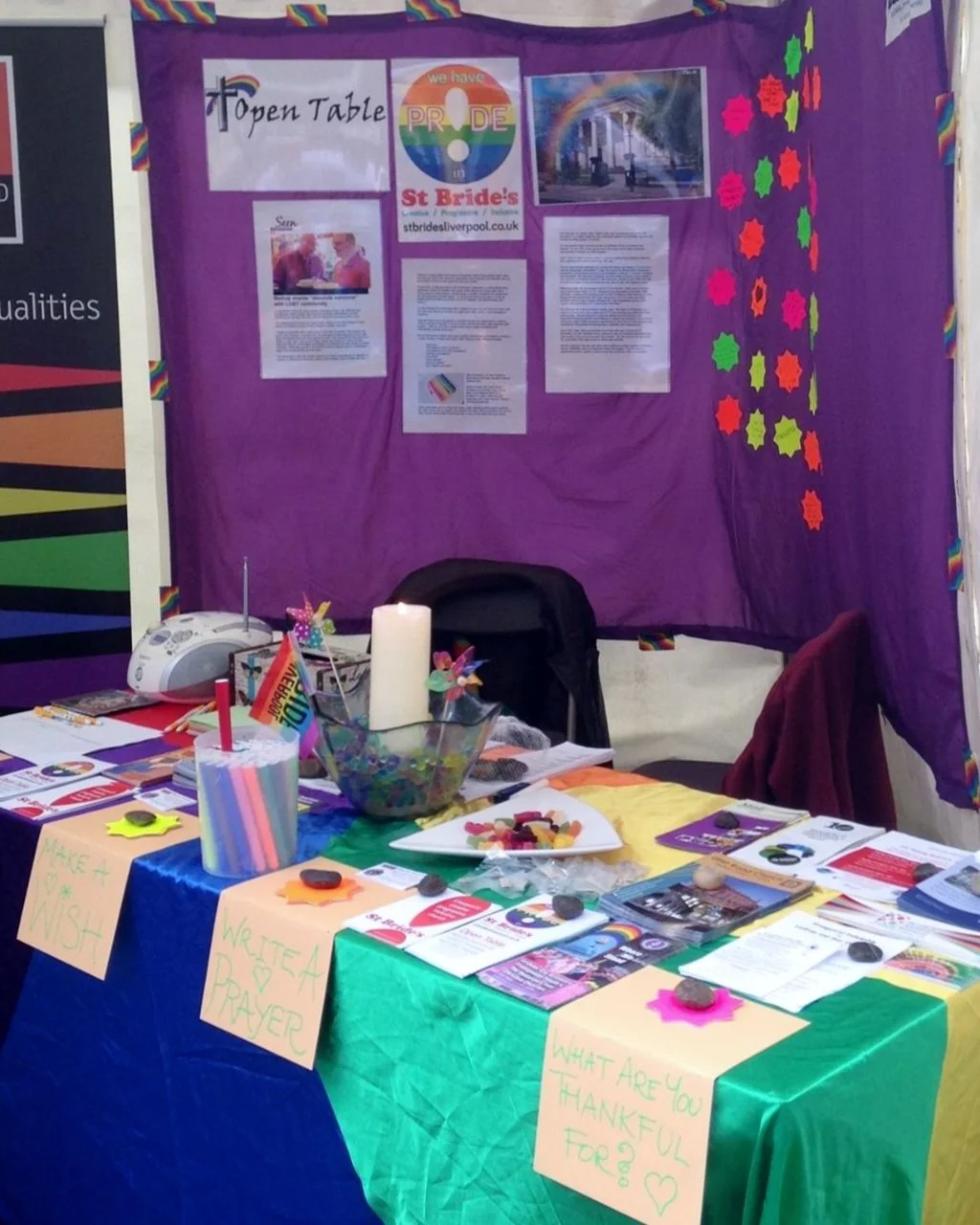A very queer* time – Bishop goes viral, Quest continues, Love in the dock, God loves hugs & Michael’s mates
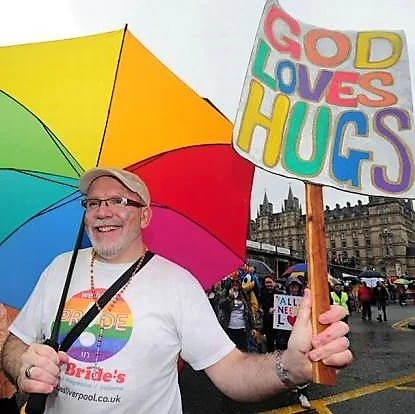
Open Table Liverpool community co-facilitator Kieran Bohan eading our church group in the Liverpool Pride march, with one of a series of affirming and apologetic messages. PHOTO: Liverpool Echo
*Queer – originally meaning odd, used as a term of homophobic abuse, reclaimed by activists as a defiant act of liberation, now interpreted to mean radical transgression of norms – see my comments on Keith Sharpe’s book The Gay Gospels below.

Bishop of Liverpool Paul Bayes with St Bride’s LGBT Ministry Facilitator Warren Hartley
IT’S BEEN an extraordinary few weeks since the Bishop of Liverpool’s visit to the first Open Table community in Liverpool. Community co-facilitator Kieran Bohan shares some highlights:
Publicity for the Bishop’s visit:
I adapted the text of my last post into a media release, which went out to a number of publications – it appeared in the local paper, not once, but twice, and a website for the city’s LGBT community.
The Church Times, which calls itself ‘the world’s leading Anglican newspaper’, included two of the photos we shared with captions about the anniversary service alongside a range of interviews about a session of the Church of England’s Shared Conversations on Scripture, Mission and Human Sexuality.
My report on the bishop’s visit had more than 1000 views in a week, the fastest traffic I’ve had in nearly three years of running this blog. It also had 200 views on the Modern Church website which I edit.
It was also picked up by other websites on opposite ends of the Anglican spectrum – the conservative Anglican Mainstream, which calls itself ‘an information resource for orthodox Anglicans’, who were most concerned that the Bishop didn’t explicitly mention the Bible in his reflection on the readings he had selected for the service, and Thinking Anglicans, which ‘proclaims a tolerant, progressive and compassionate Christian spirituality’. More than three times as many people clicked on the link from the Thinking Anglicans blog than from the Anglican Mainstream site (193 compared to 60).
Overall the feedback has been very positive – as a result of the publicity we also heard from a vicar who runs an LGBT-inclusive monthly communion service in Manchester, who wrote:
That is a lovely report. We’re borrowing the term ‘Open Table’ for our monthly LGBT Communion (hope that’s OK and that you see that as a compliment!). – last Sunday of the month at 5pm from September.
We are meeting this vicar shortly to explore informal links with you, and perhaps share ideas. Plus last month the first Open Table service took place at a church in Warrington – at this rate it could become a ‘franchise’ of LGBT-affirming worship communities – we’ll need a regional conference before long!
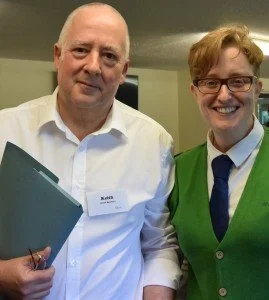
Quest conference speakers Keith Sharpe and Ruth Hunt
Quest Conference: ‘The Bible: Friend Or Foe’
The weekend after Bishop Paul’s visit, my partner Warren and I attended the annual conference of Quest, the UK national society for LGBT Catholics. I ran the local Quest group and held monthly meetings for five years, until I left the Catholic Church for reasons I have explained here.
I haven’t been to a Quest conference since before I left and stepped down as Convenor of the Liverpool group in 2011. It was good to be back.
My main reason for going this year was to hear one of the speakers, Ruth Hunt, the chief executive of Stonewall, the UK LGBT rights charity, since July 2014. She spoke about own faith journey, Stonewall and her role in it, and her vision for future campaigning, including working with the Church of England. But her most revealing comment was:
It is more challenging to come out as a Catholic than as a lesbian.
She inadvertently revealed her Catholic faith earlier in her career at Stonewall when she answered a call from a journalist in response to the news that the Archbishop of Westminster had cancelled the ‘Soho Masses’ for LGBT Catholics and moved them to a new venue. So when she was promoted as head of the organisation she received harsh condemnation from online commentators who compared her role to a Nazi running a charity to support Jews.
Quest national committee member Terry Weldon wrote of her personal testimony:
It has often been observed that for LGBT Catholics, with the rapidly increasing acceptance of sexual diversity it can be more difficult nowadays to come out as Catholic in the gay community, than as gay in the Catholic community. This was certainly the case for Ruth. She came out as gay at an early age, was publicly known as lesbian at Oxford, and has been publicly visible as such throughout her professional career. Meanwhile, her Catholic faith has always been important to her, but been a more private part of her life – until a few years ago she was inadvertently “outed” as Catholic. The hatred and opposition she then received from some LGBT activists she compared with the homophobia that LGBT (people) decry when directed against themselves by Christians.
It was a salutory reminder that those among who have been demonised for identifying with a minority group need to rise above the temptation to dehumanise others in return, as this entrenches our positions and perpetuates the cycle of prejudice.
Ruth spoke of the subtle diplomacy, or ‘nudge culture’ Stonewall lobbyists have used to campaign for change at the highest levels of Government. Though its methods have been controversial, Stonewall has had substantial successes with the 30 year plan for legislative change its founders created when it was established in 1989, such as the equalisation of the age of consent and the end of the ban on LGBT people in the armed forces. Some change has happened more quickly than expected, notably the reform of the marriage laws in England, Scotland and Wales (Northern Ireland, though first in the UK to grant civil partnerships, still does not permit same-sex marriage).
Such success would have been unlikely if they had adopted the more ‘direct action’ approach of campaigners like Peter Tatchell and Outrage, who has threatened to ‘out’ gay bishops to expose the hypocrisy of those in power. He too is exceptionally dedicated to human rights campaigning and has gone further than others in championing the cause, including attempting a citizen’s arrest of Zimbabwean President Robert Mugabe for human rights abuses, and being beaten and arrested in Russia for protesting a Government ban on a Pride march in the city. The injuries he suffered on both these occasions led to brain injuries which forced him to resign as a potential Parliamentary candidate. Both approaches are needed in the campaign for full equality.
LGBT Catholics and other Christians may be able to learn from the ‘nudge culture’ of Stonewall to affect change in church institutions. Stonewall is committed to being part of the solution, and is already working with the LGBTI Anglican Coalition and other faith groups to make this happen.
Ruth shared that while substantial legislative change has been achieved, it is only fully effective for those in positions of privilege – white, assertive people working for major employers. Due to barriers of poverty, education, social class, ethnicity and religion, it is still not true that all LGBT people can feel safe and equal. Hence Stonewall has introduced a new vision:
Stonewall believes in a world where all people, everywhere have the right to be themselves and be accepted without exception. And until all lesbian, gay, bisexual and trans people can do this, whether in their place of worship, in sport, at work, at school, overseas, we still have work to do.
Stonewall has also been controversial for its lack of engagement with transgender rights issues, but earlier this year, Stonewall announced plans to rectify this following consultation with more than 700 trans people.
I was also pleased to note that Quest is making more effort to be inclusive of gender diversity, as it was not in my time as a local group convenor. The theme of next year’s conference is: ‘Male and Female God Created Them’, with keynote speaker Tina Beardsley, author of The Transsexual Person is My Neighbour: Pastoral Guidelines for Christian Clergy, Pastors and Congregations.
The main speaker at the Quest Conference last month was Keith Sharpe, author of The Gay Gospels: good news for lesbian, gay, bisexual and transgendered people. His most interesting points for me were his responses to these questions:
-
Was Jesus Christ queer?
-
Is God queer?
-
How do we read the Bible as a queer text?
Keith uses a definition of ‘queer’ commonly used in academia, which I quoted at the top of the page:
-
originally meaning odd, used as a term of homophobic abuse, reclaimed by activists as a defiant act of liberation, now interpreted to mean radical transgression of norms.
which is not confined to, though not excluding, diverse sexual orientations and gender identities.
Keith argued persuasively that, in the sense of liberation and radical transgression of norms, the answer to all three questions is a resounding YES!
-
Jesus: born into an outcast family, stigmatised, revolutionary liberation activist, dissolving the binary categorisations between Jew and Gentile, human and divine, death and life.
-
God: ‘comes out’ as god of love in Jesus, not the ‘malevolent bully‘ of the Old Testament as caricatured by Richard Dawkins.
-
The Bible: Keith argues for the validity of reading the text through the lens of this radical, transgressive God and Christ, as the overall direction of the whole Bible is from exclusion to inclusion. Jesus’ invitation to fullness of life, ‘I have come that they may have life, and have it to the full’ (John 10:10) is not a meek submission to destructive normalities, but a focus on what uplifts us and validates our lives.
Keith compared ‘queer’ readings of the Bible and theology to slaves who were willing to be Christians though it was the instrument of their oppression, because they read the stories in ways which reflected their experience and gave them hope. He sees this as the invitation to LGBT Christians, because God chose transgressive human experience to include everybody, especially those at the margins of society, who became central figures of our faith tradition.
If my summary has not done Keith’s exposition justice, perhaps this video he showed us will help (4 minutes):
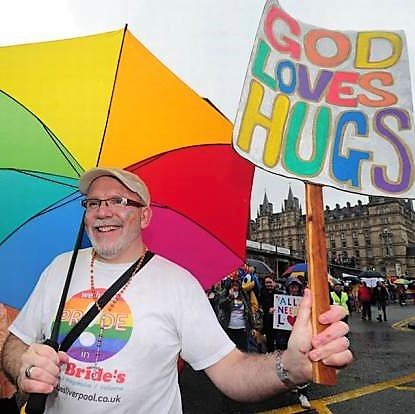
attachment-6182bb44e24a9422e3ca98aa
exc-6182bb44e24a9422e3ca98aa
